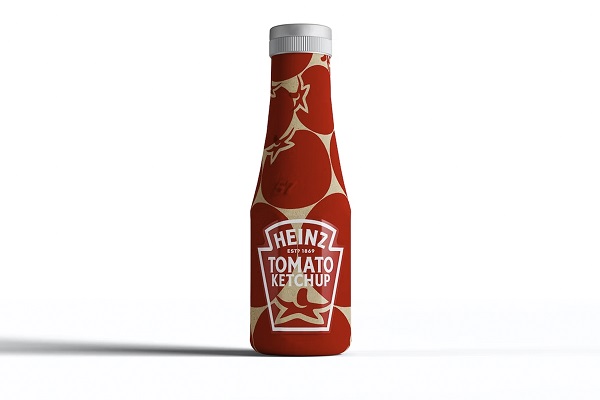EarthTalk®
From the Editors of E – The Environmental Magazine

Heinz is working with Pulpex to prototype a food-grade bottle made from sustainably sourced wood pulp that can be recycled and biodegrades if it is thrown away.
Dear EarthTalk: What’s new in food packaging to make it more sustainable? – E.C., Bern, NC
Along with food waste, food packaging is a significant source of pollution, generating approximately half of the packaging waste in the United States. In the wake of growing concerns about climate change and food product packaging’s role in it, companies are taking action to make packaging more sustainable.
There are many changes in progress. Corn and cane sugar plants are being increasingly used as materials for packaging food. However, this system puts pressure on already-stressed agricultural land and can jeopardize food security, since crops that could be used for food itself are being used for other purposes.
One solution is to use agro-food residue, the byproduct of agricultural production—cornstarch, rice husks, etc. that would otherwise be discarded—for food packaging. In this way, packaging can reduce agricultural material waste without threatening agriculture or food resources.
Companies have begun taking the whole life cycle of a product’s packaging, beyond just use and disposal, into consideration. In doing so, they have prompted designs of products made from and transported using sustainable materials, not just ones that can be recycled by customers.
For example, Heinz is working with Pulpex to prototype a food-grade bottle made from sustainably sourced wood pulp that can be recycled and biodegrades if it is thrown away. It has a 90 percent lower carbon footprint than glass and a 30 percent lower footprint than PET, a very common type of plastic in food packaging.
Other examples abound. Alter Eco worked with Natureflex to create truffle wrappers that are made from eucalyptus and birch and then lined with aluminum. The material reportedly composts in industrial settings and biodegrades in the ocean. Boxed Water is Better sells water in recyclable boxes, made of 75 percent paper that is flatten so efficient for shipping, allowing one truck to carry as many boxes to filling centers as 26 trucks carrying plastic bottles.
The company also ensures that the paper comes from well-managed forests, that the material is free of BPAs and other chemicals, and that part of the profit is invested in planting trees in deforested and fire-prone areas.
Mondelez, which produces snacks like Oreos, and Wheat Thins, Ritz and Belvita crackers, has almost reached its goal of reducing its use of virgin plastic by 25 percent for rigid packaging and by five percent overall by 2025.
Such technologies are creating more effective food packaging that reduce waste, but these solutions face obstacles. Investing in sustainable materials and partnering to develop new ideas, combined with the supply chain and inflation disruptions associated with the pandemic, come with potentially prohibitive financial costs that have impeded some planned transitions.
Also, demonstrating the benefits of these changes has proven to be difficult, and “greenwashing”—marketing that overstates companies’ products’ environmental pluses—has made investors wary.
However, the chances of success are significant as growing numbers of customers demand sustainable packaging. For example, 24 percent of young adults have indicated a willingness to pay five percent more for sustainably packaged food.
CONTACTS:
“The Next Generation of Sustainable Food Packaging to Preserve Our Environment in a Circular Economy Context,” frontiersin.org/articles/10.3389/fnut.2018.00121/full
“16 Companies Rethinking Packaging,” greenbiz.com/article/16-companies-rethinking-packaging
“Mondelez Targets New Plastic Use in Packaging,” fooddive.com/news/mondelez-targets-new-plastic-use-in-packaging/596260/
EarthTalk® is produced by Roddy Scheer & Doug Moss for the 501(c)3 nonprofit EarthTalk.
See more at https://emagazine.com
To donate, visit https//earthtalk.org
Send questions to: question@earthtalk.org
